Shifting regulations, geopolitical tensions, and technologies have a complex impact on the asset management industry. How are asset managers best positioning themselves to capitalize on these shifts and adapt to evolving risk appetites? What are the under-analyzed regulatory and political changes on the horizon? Which technologies have been the most disruptive or over-hyped?
Moderator
Joseph Dowling CEO, Investment Office, Brown University
Speakers
Rick Lacaille Executive Vice President and Global Chief Investment Officer, State Street
Daniel Lopez-Cruz Head of Private Equity, Europe, Investcorp
Neal Wilson Co-Founder and Chief Operating Officer, EJF Capital
Q4 hedge fund letters, conference, scoops etc
Asset Management Outlook 2018
Transcript
Onto the asset management outlook. Thank you for coming. Appreciate it. Just a few housekeeping items before we start one we would encourage you to use the app after the presentation to give us some feedback and if the conversation is interesting enough please follow up on Twitter.
You all have the biographies for my esteemed panelists but I will introduce them. Daniel Lopez Cruz is the head of private equity for investCorp. And next we have Neil Wilson who's the co-founder of EGF at ten billion dollar asset manager. And then Rick lokai who's the CEO of State Street. And let's get right into it. You guys don't want to hear from me. Rick why don't you start us off with some structural changes or disruptions that you see facing you as an allocator.
And I guess first you have to ask where returns come from are saying how are we going to make money where do returns come from. They come from risk premia. They come from structural opportunities. And I think often they're underestimated so we focus on the trade of the day as a kind of unexpected information is those risk premium. Very important in driving returns in the long term. And I think right now what we think people should be focused on is the opportunity in front of them in terms of risk so we were risk at the moment is very tactical short term but in terms of efficiency portfolio we should focus on how you can get exposure those risk premium with very low prices whether it's fact based investing will smart be to then conserve your fee budget on your risk budget for those impactful active trades that are really going to make a difference. Don't over diversify don't have too many active managers focus your attention on things that are going to payoff where skill pays off from where the fees payoff. But I think now this is an opportunity to benefit from the equity risk premium but also some elements of illiquidity and some of the concentrated portfolio designs that we see being very important including private equity and they liquids.
So when you talk about concentration because it's an interesting it's an interesting topic. How do you think about concentration in say the top 10 positions in your portfolio or the top 20 positions in your portfolio for instance at the brown endowment. We have about 33 percent in our top 10 and about fifty four percent and are our top 20. And we have to balance preservation of capital with growth of capital. But how do you how do you look at. At. Assembling your portfolio in terms of concentration. How do you think about that.
Well I think from an active perspective the fundamentals were back to management are critical. The more the deeper your information set the more pre produced for you to have a very concentrated portfolio or to put it another way if you know a little about a law then it makes sense to be more effective based investor and diversify very widely. And I think there's room for both. So I think in a typical portfolio design you'd have a fact based investing strategy which you are profiting from these very small valuation arbitragers. But then if you can find a manager who has got very strong insights into a small number of companies you'd be much more concentrated in that part of your portfolio. The thing to do is not to mix and match inappropriately. So if you got people who claim they know a lot and want to run out of concentrated portfolio you've got to be super skeptical.
You run a very large asset management firm. How do you think about these structural changes and taking advantage of them.
So we're a regulatory event driven shop so we are based in Washington D.C. and we focus on changes in the regulatory world and how that creates investment opportunities. So for us what we think is a really juggler player right now is really the small banks. So even though it's hard to believe that there is bipartisanship in the United States and Congress in May of this year there was something called the bipartisan Relief Act Regulatory Relief Act. And it was passed with bipartisan support. And what it did is not undo Dodd Frank and has it applied to banks but it recalibrated as applied to regional and in particular in our view small banks because in the United States it's very different. You have 100 banks here in theU.K. We have 50 200 if you go back 10 years you had 10000. So there is a consolidation story going on in the banks and the Federal Reserve wants that to happen. And part of the regulatory relief bill that was passed in May. Is it creates really an opportunity to buy equity but in particular we think the most interesting is the debt and then the other thing I would just as a related point say is that when the tax bill was passed in December of 1997 the tax cut and jobs act that was it was known






